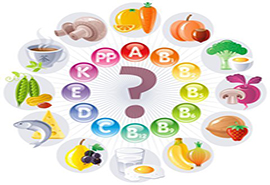
Vitamins
Vitamins are essential micronutrients your body needs to function properly. Each vitamin has specific roles and functions, and can be obtained from a category of food.
To enjoy all the vitamins and their benefits, opt for a balanced diet with a variety of food.
Fat-soluble vitamins
These vitamins bind to fat in the stomach in order to be absorbed, and then stored in the body.
Vitamin A (Beta-carotene)
- Essential for vision
- Boosts immune function and bone metabolism
- Acts as an antioxidant
- Keeps skin and tissues healthy
- Found in milk, eggs, meat, fish liver oils, green leafy vegetables, yellow and orange fruits and vegetables
Vitamin D
- Regulates the absorption of calcium and phosphorus for bone health
- Boosts immune function
- Reduces the risk of osteoporosis
- Found in dairy products, sardines, tuna, salmon, egg yolk, yeast and formed in skin when exposed to sunlight
Vitamin E (Tocopherol)
- Important antioxidant that protects cell membranes
- Protects vitamin A from oxidation
- Found in whole grains, nuts, seeds, plant oil, green leafy vegetables and egg yolk
Vitamin K
- Essential for blood clotting
- Maintains bone health
- Found in milk, green leafy vegetables, cabbage, broccoli and cauliflower. Could also be synthesized in our digestive tract
Water-soluble vitamins
Water-soluble vitamins can be absorbed directly by cells.
Vitamin B1 (Thiamine)
- Helps in energy production
- Helps the body process carbohydrates and some proteins
- Maintains appetite and normal digestion
- Essential for proper nerve function and cardiovascular system
- Found in whole grain cereals, legumes, eggs, potatoes, nuts, beans and brown rice
Vitamin B2 (Riboflavin)
- Helps in converting food into energy
- Helps in metabolising some drugs, fats and carbohydrates
- Helps in the production of red blood cells
- Supports normal vision and skin health
- Found in milk, yoghurt, chicken, meat, asparagus, whole grains and green leafy vegetables
Vitamin B3 (Niacin)
- Manages cholesterol levels
- Promotes healthy skin
- Supports nervous and digestive systems
- Helps release energy from carbohydrates
- Found in all protein containing foods, whole grains, nuts, carrots and tomatoes
Vitamin B5 (Panthothenic acid)
- Used in energy metabolism
- Needed for enzymes synthesis
- Found in protein containing foods, whole grains and legumes.
Vitamin B6 (Pyridoxine)
- Promotes a healthy nervous system
- Helps in breaking down proteins
- Helps to release sugar for energy
- Found in fish, poultry, whole grains, shellfish, bananas, eggs, green leafy vegetables
Vitamin B7 (Biotin)
- Has a role in cell growth and metabolism
- Helps with energy production
- Maintains blood sugar levels
- Found in cooked salmon, egg white, whole grains, nuts, avocados and legumes
Vitamin B9 (Folic acid)
- Necessary in DNA production
- Essential for blood cell formation
- Critical during growth and development
- Prevents birth defects
- Found in beans, cereals, legumes, seeds, brown rice, oranges, dark green leafy vegetables
Vitamin B12 (Cobalamin)
- Maintains nerve cells
- Participates in metabolism and red blood cell formation
- Found in animal products (meat, fish, poultry, shellfish, eggs, cheese, milk) and fortified foods
Vitamin C (Ascorbic acid)
- An important antioxidant
- Improves absorption of iron
- Promotes collagen formation
- Helps to heal wounds
- Supports the immune system
- Found in citrus fruits, red berries, red and green bell peppers, cabbage, broccoli, tomatoes and spinach


